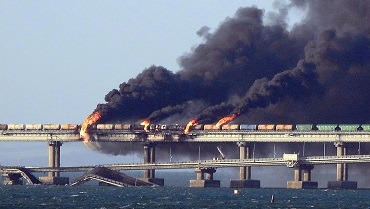The Australian Alert Service is the weekly publication of the Australian Citizens Party.
It will keep you updated on strategic events both in Australia, and worldwide, as well as the organising activities of the Citizens Party.
To subscribe to the Australian Alert Service, it's easy, and it's secure.
Lead Editorial
12 October 2022
Vol. 24 No. 41
The incessant march to world war continues. Deliberate sabotage operations are preventing the pathway to negotiation and diplomacy, the latest being the 8 October attack on the Kerch Bridge connecting Crimea to the Russian mainland. It comes hot on the heels of sabotage of the two Nord Stream gas pipelines. In a 10 October meeting of the Russian security Council, the morning of Russia’s retaliatory strikes, Russian President Vladimir Putin mentioned other terrorist attacks, including against Russia’s Kursk Nuclear Power Plant and an attempt to blow up a section of the TurkStream gas pipeline. “It is simply no longer possible to leave crimes of this kind without retaliation”, he said.
Ukrainian President Zelensky on 6 October called for preemptive strikes against Russia to prevent alleged Russian use of tactical nuclear weapons, but it was Russia, at the UN General Assembly, restating its commitment to international law in the form of a January UN Security Council joint statement on the inadmissibility of war between nuclear-weapon powers.
In the Berliner Zeitung, former German Chancellor Gerhard Schröder declared we are in the most dangerous decade since World War II. The opportunity for a new European peace order that presented itself at the end of the Cold War was not taken “because it was not wanted by important NATO partners, above all the United States”. While an agreement between Russia and Ukraine was close in March, he wrote, “The further course of the war, also the extensive arms deliveries and, according to Ukrainian media reports, Western interventions in Kiev, were decisive for an abortion of these promising negotiations.”
The West has exposed itself by openly backing a Nazi-inspired government (Almanac). An opinion piece in Newsweek by two former US diplomats observed: “Nearly 90 per cent of the world isn’t following us on Ukraine”. Numerous representatives at the UNGA insisted on negotiations for peace. Indonesian Foreign Minister Retno Marsudi demanded a “new paradigm ... to reignite the spirit of peace.” Brazilian President Jair Bolsonaro demanded a pathway of “negotiation and dialogue” as the “stability, security and prosperity of humankind are at serious risk”.
Others called for a new paradigm for more representative international decision-making, including South Africa, Kenya and the Congo. Argentina called for reform of the international financial system, as did Barbados. The PM of Belize stated: “We need a full-scale, bold reimagining of the global financial architecture.”
Why major world powers are willing to risk full-blown nuclear world war becomes clear when the extent of damage to their financial control mechanisms is assessed. It is quite likely that the new British PM’s actions to assert tighter economic control has exploded the global derivatives bubble.
The Bank of England informed the Parliament in a 5 October letter that the Truss government blunder had “come within hours” of collapsing major British pension funds and the City of London banks which provided leveraged loans to those funds. This could have led, said the bank, to “a self-reinforcing spiral of price falls and further pressure to sell gilts”.
Bank of England staff worked through the night on 27 September “in close communication with HM Treasury staff on the options available”. The interest rate derivatives at the heart of the crunch make up 82 per cent of the US$606 trillion over-the-counter derivatives globally (according to underestimated end-2020 BIS data). The 2008 crash was triggered by US$65 trillion of credit default swaps.
The City of London’s Economist warned on 4 October that “The world is entering a new phase”, in which trouble in the financial markets could lead to “catastrophic pain ... when financial institutions fail”. The journal’s assessment that central banks cannot simultaneously bail out their financial system and bring down hyperinflation is accurate. The solution, as the Citizens Party has always maintained is, however, straightforward: Governments guarantee everything needed to save the people and expand the real economy, but allow the speculative financial paper to collapse.
In this issue:
- Must watch! Risking a life sentence to expose war crimes and lies
- Regional Banking Taskforce is the banks’ say, not the final say, on a postal bank
- Investigate ASIC now!
- Rewriting the rules of international finance, Step One
- Systemic contagion at Wall Street banks is already here
- Review: ‘No one wanted to call the Fed’s QE a Ponzi Scheme. But it was.’
- Everyone except Russia meddled in Italy’s general election
- Sabotage of the Nord Stream pipelines: For once, the question ‘cui bono?’ is not sufficient
- Already repairing Kerch Bridge, Russia does not rule out ability to fix Nord Stream
- The truth about Taiwan, Part 1
- Will the ALP put ASIC in the public crosshairs?
- Thousands rally for Assange
- Fission/fusion progress: harnessing the power of nature
- ALMANAC: International calls to stop Kiev’s killer list-makers
Click here for the archive of previous issues of the Australian Alert Service








